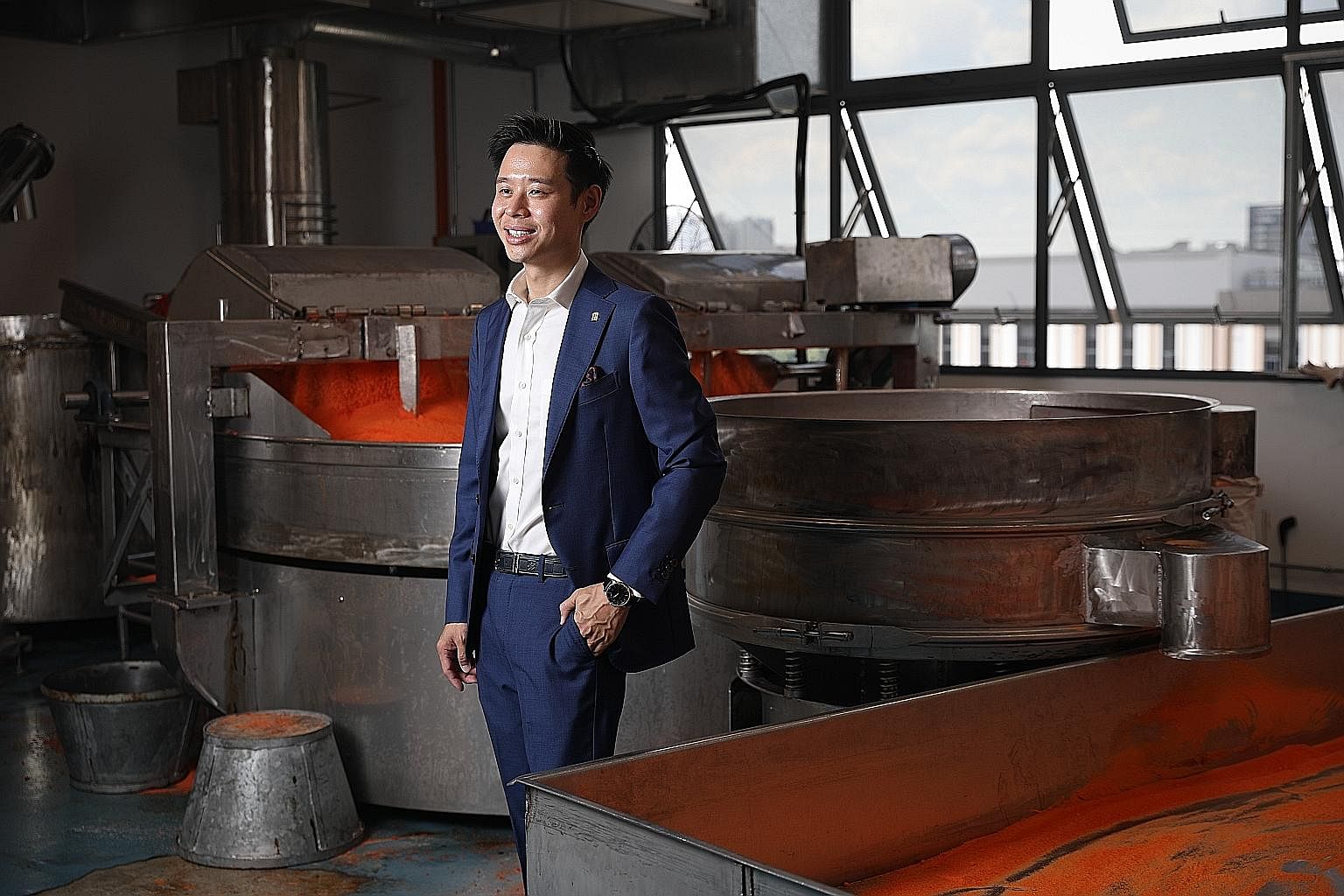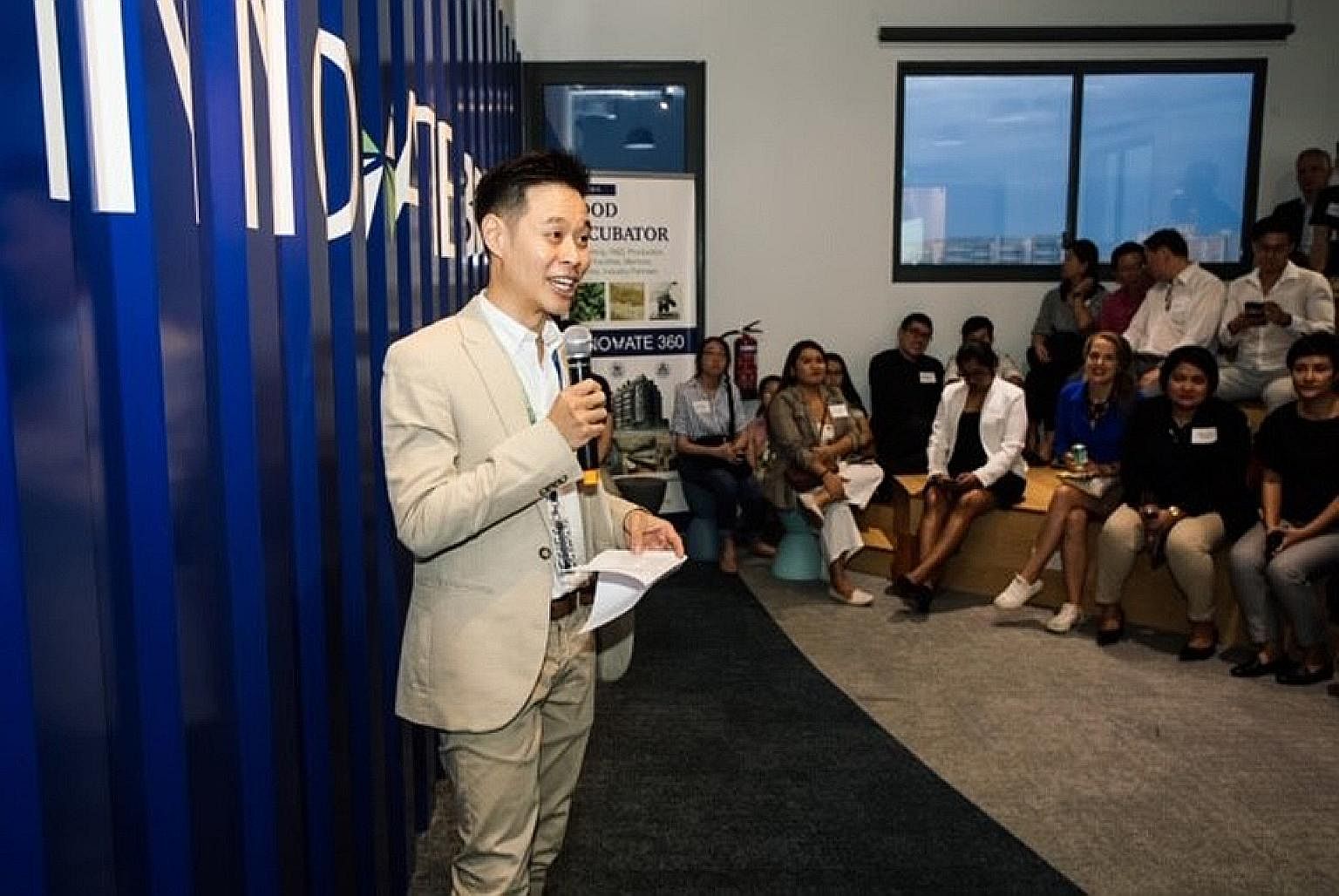It Changed My Life: Hitting the sweet spot
3G business owner of Singapore's only sugar manufacturer helps other food start-ups grow
Sign up now: Get ST's newsletters delivered to your inbox
Mr John Cheng is getting excited talking about developments in the Singapore food landscape.
There's a home-grown start-up called TurtleTree Labs, he says, that makes milk in the lab.
"You don't need cows anymore. Now, they're moving towards human milk," he says, adding that the company has found a way to culture stem cells that secrete milk.
Another one - Opal Resources - does vertical fish farming.
"They basically 'grow' fish in containers, and they give it a special feed which makes catfish taste like unagi (eel)."
Yet another one - SinFooTech - turns tofu waste into alcohol.
The three start-ups come under Innovate 360, Singapore's first incubator for businesses in food manufacturing, food technology, agriculture and aquaculture.
Set up by Mr Cheng about three years ago, it gives innovative start-ups a leg up in commercialising and scaling their business by providing resources, networks and facilities.
Food innovation, food sustainability and healthier food options are issues close to Mr Cheng's heart.
It explains why he founded the incubator and why he is chairman of Feed 9 Billion, an open innovation platform which hopes to find sustainable solutions to feed the global population, which is expected to hit some nine billion in 2050.
"Now with the Covid-19 pandemic, the issue is even more critical," says the 38-year-old.

Cheng Yew Heng's third-generation business owner John Cheng left his banking job to help out in his family's 73-year-old traditional sugar-making business. His grandfather started the company in 1947, producing hawthorn, but in the 1950s, Mr Cheng's father changed tack and started making sugar.
ST PHOTO: ONG WEE JIN
His foray into the world of start-ups and food innovation was serendipitous, sparked only after he reluctantly left a banking job to help out in his family's 73-year-old traditional sugar-making business.
His grandfather Cheng Keng Kang started Cheng Yew Heng in 1947, producing hawthorn. The name was chosen because it combined the family surname with the characters for friendship (Yew) and happiness (Heng). The rationale? Family and its partners - employees, clients, suppliers - working like friends combine to make a recipe for happiness.
In the 1950s, Mr Cheng's father changed tack and started making sugar because of stiff competition from Chinese hawthorn imports.
To this day, Cheng Yew Heng is the only sugar manufacturer in Singapore. Its rock sugar was featured in a Made in Singapore products exhibition held at the National Museum as part of the SG50 celebrations five years ago.
Mr Cheng says: "The difference between rock sugar and normal sugar is that rock sugar has a more rounded taste. A lot of our local heritage foods like bak kut teh and prawn noodles use rock sugar."
The old Cheng Yew Heng factory was located in Upper Serangoon Road. The youngest of six children, Mr Cheng lived with his family in a shophouse near the factory.
"I remember we had to go past a goose pen from the house to the factory, and each time we walked past, the geese would make a lot of noise," he recalls.
His late father was a very hands-on businessman who ran the factory with a lean team. "He had one secretary who did his accounts and everything else: picked up phone calls, arranged the lorries to dispatch orders. He often stayed late and waited for the last vehicle to come back so he could count the bills and money. I liked to count money with him because sometimes I'd get tips," Mr Cheng says with a grin.
On weekends, his old man would take him to markets and elsewhere to meet customers. "And during the school holidays, I had to follow him to the factory and just hang around. I hated it because I'd rather be home, playing with my friends," he says, adding that he had to sweep and mop the floors of the factory and fix computer problems too.
But his elder siblings, he says, had it worse because they had to go to the factory - later moved to Chin Bee Crescent in Jurong - to make rock sugar.
The former student of Swiss Cottage Primary and Monk's Hill Secondary did well in school.
"My mum would cane me if my results were bad, so I'd always go to my father who would say: 'Don't worry about it. If you fail, you can just work in the factory.'
"I was like, no, I don't want to work in the factory, please, no. So that spurred me to study harder.
"But having followed him around, I guess it was an unsaid thing that eventually, I would have to take over," he says.

Mr John Cheng at Innovate 360 last year, launching the Good Food Startup Manual to help food start-ups navigate starting a business.
PHOTO: JOHN CHENG
After graduating from Singapore Management University (SMU) - where he majored in operations management and marketing - in 2007, he landed a job at HSBC as an assistant manager in business transformation.
The foodie had plans to open a ramen shop with a friend but these were scuppered in 2008 when his father was diagnosed with myeloid leukaemia - a type of blood cancer - and died a few months later. Mr Cheng had no choice but to join his two elder brothers (his sisters are not involved) in the family business. It was a shock, he says, going from an MNC set-up to a factory, and leaving his life in chic Shenton Way for one in a remote industrial enclave in Jurong.
Tougher still was trying to overhaul operations and getting the business compliant with acceptable regulatory standards.
The company had an ageing workforce, there were no records, organisation chart or business continuity planning. "We didn't even know how much sugar we were producing. The person making the rock sugar was an old man; only he himself knew how much sugar to put in. It was all in the mind. And the guy would never take sick leave," says Mr Cheng, adding that there wasn't even a proper leave system.
It didn't help that he was perceived as the ah sia kia - a snarky Hokkien term meaning rich man's son. "They'd tell me they had eaten more 'sugar' than I'd eaten rice," he says.
It was a bumpy ride but he learnt not just about the business but about himself and his strengths.
"So I went to university and worked in a bank. So what? That is finance; this is manufacturing. So I had to put myself out there and learn as much as I could," says Mr Cheng, who attended a lot of courses on subjects ranging from human resource to leadership and workplace safety.
"At the end of the day, it's relationships. I remember visiting customers who complained about the company under my dad. You just have to sit there and listen. You have to humble yourself and just take a step back and see what's our business doing, what we are doing, how we can do it better. So, it was a lot of self discovery as well."
Candidly, Mr Cheng, who is single, says he nearly threw in the towel on a few occasions.
"But I learnt to think, and see things through my father's eyes. Basically he never gave up. We watched him go through tough times. He struggled but he had a lot of tenacity," he says, remembering how his family once had to sell their home and downgrade to a smaller one when a worker made off with a few hundred thousand dollars.
It took him several years before he successfully introduced systems, processes and automation; and overhauled operations.
"It's through taking little steps; it was doing small projects well that really earned me respect and trust from the company," says Mr Cheng.
"What I learnt over the years is that when it comes to family business, you need to have a bit more patience, you need to sometimes compromise. And you also need to recognise your workers' contributions because a lot of them have worked with us for so many years."
His experience led him to set up the SMU Business Families Alumni Group in 2015. It is a platform for members, numbering nearly 150 from different industries, to network and explore collaborations.
"It's opened my eyes as well to a whole new network of people who actually understand what you're going through. We try to see how we can help each other. There's been a lot of collaborations between different industries, even similar industries as well," he says.
After modernising the company, he beavered away at brand building and product development.
A traditional business-to-business outfit, the company also provides logistic services for the industry and is a distributor for sugar and flour.
Mr Cheng decided to get into business-to-consumer transactions as well. He started with the Cheng Sugar brand in 2014, and two years later, launched his line of Jewels Rock Sugar Sticks which earned him a lot of press.
Although sugar sticks were already available in Europe and the United States then, the market had never seen rock sugar sticks in different colours and flavours - including French vanilla and jujube.
Originally conceived as stirrers for beverages and cocktails to attract the younger set, the rock sugar sticks - now available in 15 flavours - are now also consumed as candy, especially in China, where they are sold in more than 160 outlets including supermarkets. The product is a hit in Japan and Hong Kong too.
Nearly two years ago, he embarked on his company's most ambitious project: Tearing down the old factory, which had a mezzanine level, and rebuilding it into a six-storey building.
"When we first started thinking about rebuilding, the main reason was we didn't have enough sugar to sell in terms of our own manufactured products. We wanted to ramp up production; we were getting orders from all over but we just couldn't meet the demand," says Mr Cheng.
He and his brothers decided to rebuild to the maximum. The extra space, he decided, could be used to help food start-ups.
The family's business, he says, has benefited from advice and know-how from polytechnics and universities as well as other food manufacturers.
"They were always open to sharing. Because we were helped along the way by so many people, we thought, why not? Times have changed, and I think this generation has to think differently.
"The world is our oyster basically and a lot of our sales is actually from overseas. So then how do you actually think about growing the business if you can't even help each other?"
Construction of the new building took about 18 months, during which time operations were shifted to a temporary plant in Senoko. The company moved back to the old premises - named Innovate 360 - in October last year.
"We want to show that we are innovating 360 degrees in all our businesses. It's also a reminder to us that innovation is very important," says Mr Cheng, who is now looking at producing healthier sugar with natural ingredients.
The sixth floor of the new building is devoted to Innovate 360, which has - among other facilities - laboratories, a co-working space, a kitchen and even an auditorium.
The incubator is now home to about 15 start-ups which approached Mr Cheng to tap his experience in taking a product to market. He also connects them to venture capitalists and has even invested in six of these outfits himself.
"It's really about collaboration. Through collaboration, you are able to grow. And that's also the motto of our business. Remember, my grandfather chose the name Cheng Yew Heng for a reason."
This is the last of a four-part Audemars Piguet series on trailblazers who value both tradition and innovation in a changing world.


